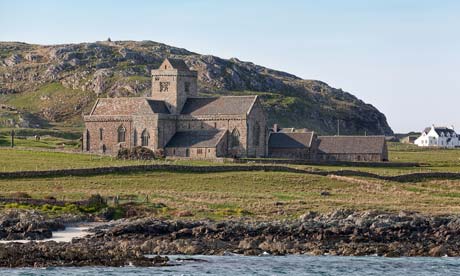
Amid personal tragedy, myWanderlust member KDBR finds solace and strength on Iona
We had watched the catch being landed earlier in the day. Drizzled with garlic butter the langoustines stared up at us, fresh enough yet almost to breathe. A warming island malt, a 10 year old from Tobermory, rinsed the palate. Through the glass we watched as the ferry struggled to approach the same jetty that had welcomed the prawns hours earlier; the same one from which we had disembarked as dawn broke. The storm had risen through the afternoon; rain lashed the white beaches; wind whipped the waves into meringues. The ferry disappeared into a trough and my stomach began to fear the short crossing that lay ahead, assuming the boat would eventually dock.
But for all that we had enjoyed peace and solitude of the type we knew we could find nowhere else. We had escaped and we had found, and we had hope once more; just the two of us.
A few weeks earlier we had been three, but it was not to be. This time the miscarriage came with shattering news. It told of chromosome disorders, horrific disfigurement, short life. Perhaps we were fortune that there would be no life, but the revelation of what may lie ahead shook us to the core. So we escaped.
From our weekend base outside Bunessan, on Mull, we followed the familiar road to the ferry at Fionnaphort. Across the Sound Iona waited, arms open and welcoming as always. It was not a day for a nap on the White Strand, for it was November, chilly and windswept, and the ferries were on the winter timetable.
I headed for the Bay at the Back of the Ocean, lost in my own thoughts, buffeted by the wind. Crossing the golf course, where the hardy island sheep grazed the machair, I reached the cockle strand and gazed out into nothing. Further west lay Boston. Waves crashed on rocks.
Gilly headed in the opposite direction, through the village, to the Abbey, as I knew she would. Candles were lit. It was not for me, one who reserved candles for blackouts. I walked thrice round Sithean Mor, the Big Fairy Mound, and tramped through the wet to rise to the summit of Dun I. Gulls rode thermals; Highland cattle turned their long-haired docks to the wind; the corncrake had long since left. All around islands rose and fell in the swell. Of the Treshnish only the Dutchman’s Cap remained on the horizon. And from Staffa the overture thundered from the cave. I could almost hear it.
We met in the Nunnery, where pockets of pink and yellow flowers clung to gaps in the ancient stones. Sheltering we shared a flask of chicken soup, and rested against the south wall of the refectory, unaware then what lay in the ancient walls above us. Tears rolled, though I swore the wind could not be blamed. Denial.
Through the clouds a ray broke above the Abbey, the tower limned in autumn light.
‘I’m finding my peace’ she said, eventually.
I was still angry, but calming as exhaustion set in as the mud dried on my boots. Guilt it was; all those years of smoking. Now it may be too late. The years had passed as inexorably as the waves crashed on the shore. But the indifference had disappeared, replaced with desire and yearning. I had been found wanting, incomplete, incapable. She didn’t deserve such pain.
‘That’s good my love, Iona always helps.’
And so it was that we found ourselves at table in the Martyrs’ Bar, fed and watered, as the ferry struggled. There was time for another dram, and a last walk, up to the tiny school, past the Nunnery, but not long enough to reach the graves of our ancient kings in the abbey grounds. Across the sound the red granite cliffs of Mull took the setting sun, seeming larger and nearer.
The ferry made the slipway, engine running, her stay brief. We had to run, together, hand in hand, bedraggled and soaked. The return to Fionnaphort was not pleasant, but then it never was. Normally a mere ten minutes or so the crossing was eternal. The tears ran again, but they often did, leaving Iona.
It was later, weeks later, that I learned of the sheela-na-gig. Apparently sheelas were not uncommon. Many buildings hosted them. But on a Nunnery, in this centre of Christianity? We had rested beneath female genitalia, made of stone, an ancient fertility symbol.
It may have been the candle, or the fairies, but whatever it was the family is now complete. Nine months later the dam burst, and within another year or so we were four, in rude health. She always believed, I always doubted. Iona healed. And every time we pass that Bunessan cottage, eyes sparkle.